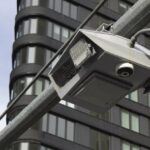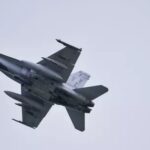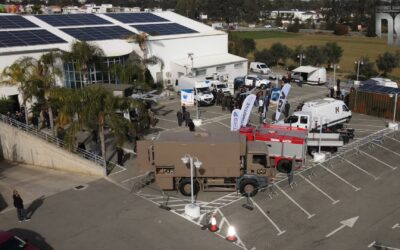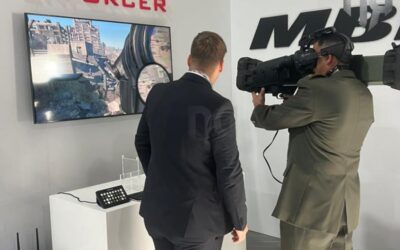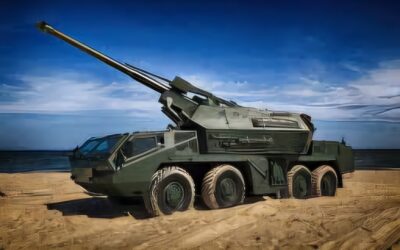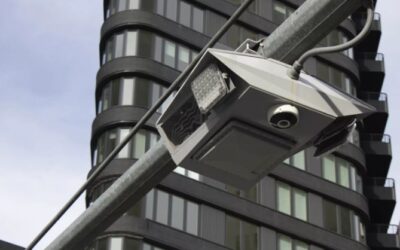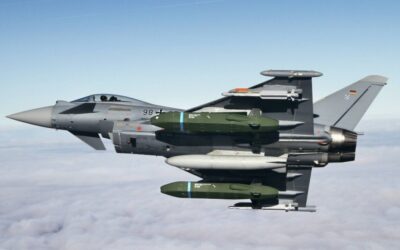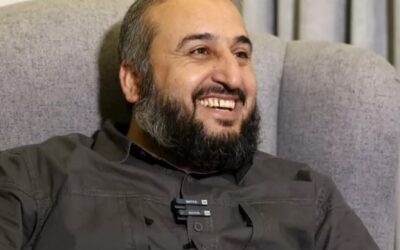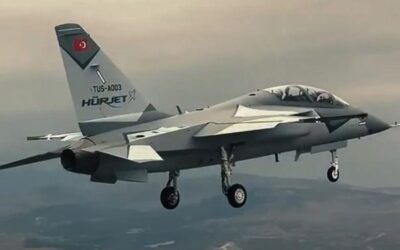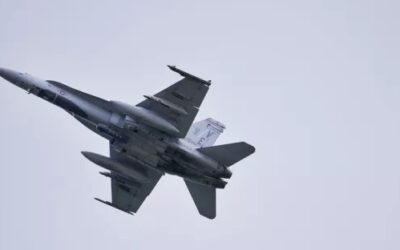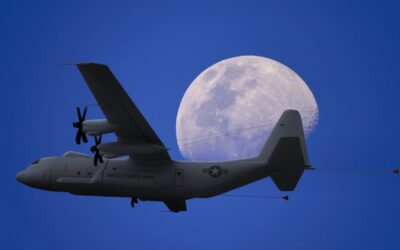The International Defence and Security Conference “BATTLEFIELD ReDEFiNED 2024” was successfully concluded on Friday, 13, December 2024…
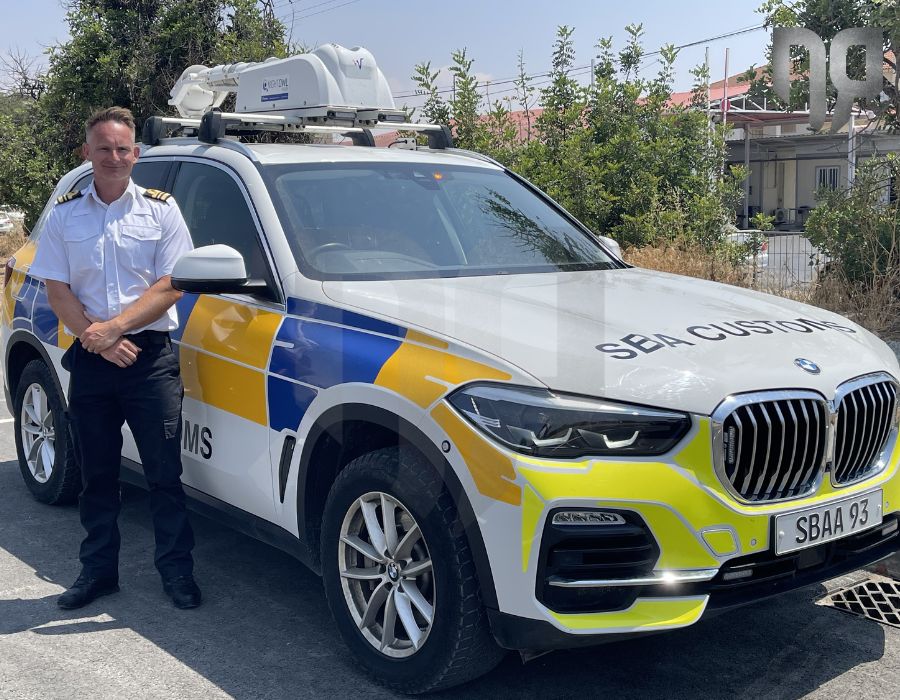
*Lambros G. Kaoullas (PhD)
DEFENCE ReDEFiNED, as part of its activities for extensive information on Defence, Security and International Relations, conducted via its special associate, Lambros kaoullas (PhD) an in-depth interview with Mark Hartley, Officer-in-Command of the Eastern Sovereign Base Area (SBA) in Cyprus.
Mr. Hartley is responsible for the two official Crossing Points in Pergamos and Strovilia in the area of Agios Nikolaos and via the interview, he presented to us, among other things, the modern equipment for surveillance available to the SBA Customs & Immigration (C&I) as well as exclusive information concerning its activities.
Read below our first part of the Interview:
LK: What is the history of BB Customs & Immigration and what’s its mission? How does it relate with the rest of the security ecosystem here?
MH: “I suppose in colonial days there was always Customs on the island of Cyprus and that was protection and obviously collection of taxes and the wider external coastline and boundaries, borders so to speak. However, in 1960, when the Treaty was signed and the enactment of this Treaty took place SBA Customs was formed, shortly after the Treaty. And what that allowed was for the Bases to have a department to collect taxes and also administer duty free schemes.
So obviously the Treaty allows for a zero-rated taxation for British Forces Cyprus and any taxes that are collected within the SBAs are paid to the Republic of Cyprus (RoC). So in the early days it was a small number of officers and it was control of duty free and collection of taxes.”
LK: Is this reflected in the EU-UK Withdrawal Agreement (Brexit), with the SBAs being in EU customs territory…
MH: “So in 2003 when the crossing points opened obviously we had to then put a resource to our two official Crossing Points. Between 2003-2004 Cyprus became a full member of the EU and what happened then is that EU legislation was enacted which controlled persons and goods crossing the Green Line. So that was sort of a major turning point for SBA Customs & Immigration (C&I) and there was a major recruitment because what we needed to do then was to have a C&I control at the two official Crossing Points and we stipulated by EU legislation for what goods can pass and what regulation and checks there are on persons passing. But also we have the wider 48 km of boundary, and that’s the boundary with the north of Cyprus, as we’ve touched on, uniquely, there’s no other, obviously, area or territory, for want of a better word, within Cyprus that has a direct boundary with the north.”
LK: Are we talking about the whole area of the Eastern Base that touched on to the occupied area, including the road that leads to Ayios Nikolaos?
MH: “Yes, that’s correct, as well. And you’ve touched on the withdrawal agreement. So part of the protocols when obviously the UK where leaving Europe, the protocols were re-addressed and were re-discussed in Brussels and they were re-aligned to how Europe, including Cyprus, wanted to control. The SBAs is UK territory, the UK are out of Europe however we enforce European legislation within the boundaries of the SBAs. That boundary line goes all the way from the west of Pergamos all the way up to Strovilia.”
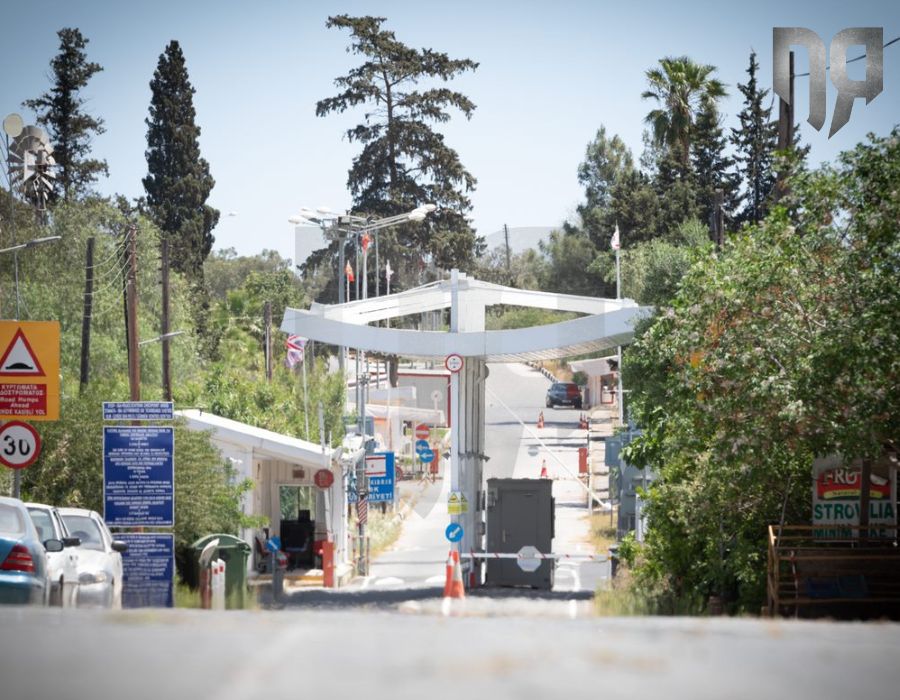
Strovilia Crossing Point
LK: Can you tell us more about this road that connects Dhekelia with Ayios Nikolaos? Is the old road that connected Larnaca to Famagusta prior to 1974. What is the legal status of this road, who patrols it and is there cooperation between C&I and the National Guard and/or the Cyprus Police in regards to smuggling of persons and goods on this road? Correct me if I’m wrong, but we can’t consider this road as “Green Line” in the conventional sense, it’s not a “buffer zone” or “dead zone”, there is no UN presence there.
MH: “No, correct. So the road itself, and several metres each side are within SBAs. And that road is within the SBAs. And those Agreements for when the Treaty was signed and its to connect the two Bases. Although we are within the Eastern SBA here, we obviously have two distinct areas, Ayios Nikolaos and Dhekelia, and its to connect the two to remain within the SBAs. But quite rightly, if you go up the road towards Ayios Nikolaos on your left you’ve got the Turkish-controlled authorities, we’ve got a boundary with them and we’ve got a number of observation posts by the Turkish military. But likewise to the right, you’ve got the National Guard and the RoC. And there’s a number of enclaves within that area, Xylotymbou for example, which obviously are within the effective control of the RoC. So, SBA C&I are responsible for patrolling along with SBA Police policing that road. And you know, there is really good collaboration. And the reason we have collaboration with all agencies on the island of Cyprus, and that will obviously would be with the RoC and the north is, we all have one common goal and that is to detect and deter.
We want to detect smuggling, we want to detect smuggling of goods, we want to detect human trafficking, but we also want to deter that activity. So we all share that same goal and for the best way for us to be efficient is for us all to work together to achieve that. There’s political difficulties that come with that however the SBA C&I are in a beneficial position in the fact that we are in the middle but obviously what we can do is harmonise both sides and to achieve the common goal. So we work closely with both agencies and we’ve had fantastic successes on that road, on the Akhna roundabout because they are areas where we have seen migration of illegal entrance. It is the Green Line and people do try and cross.”
LK: The Cyprus Problem is a political problem and the smuggling of persons nowadays seems to connect the two. Because there is an approach is the RoC that illegal immigration, smuggling and so on is, if not directly instigated, at least tolerated by the occupying regime in the north. So how do you deal with this problem that the RoC is worried that is done on purpose. How do you deal with this complex issue?
MH: “The way that is to be visible, to have increased patrols, to strengthen our protection of that boundary. And as you say, people who are migrating or across the Green Line, are economic migrants and people seeking asylum claimants. Now, obviously, those people want to get into Europe and into the European system and their access to that is with the RoC. However, how can we help and assist and what do we do, we are custodians at an EU boundary. Now what we have to do, and what we do do, is invest in that.
So we invest in our officers. We have 60 officers and we have static positions at the Crossing Points and what we can do there is facilitate the legitimate movement of people and trade. But what we also have is mobile teams and officers who can deploy from the Crossing Points and we can patrol that boundary and enforce that. Perhaps it’s almost a simplistic view, is how can we achieve it? Well, we need to stop that, and to stop that we need to be there. And I think it may help to quantify that, is our investment in technology such as new thermal cameras, equipment and vehicles.
Also read: SBA | Receipt of 6 armored BMWs for policing needs – VIDEO & Photos
Since this summer we have a complete new fleet of offroad vehicles that will be arriving with overt and covert capacity and what that will do is give a greater access to the remoter areas of the boundaries, it will give a better capacity to intercept and observe what’s going on. So the use of technology is one sort of way that we are trying to increase our enforcement. The thermal cameras is another example.

ΒΜΧ Χ5 with a roof mounted mast system made by Woodway
So we have thermal camera vehicles, they are off road vehicles so that they can get to the remote areas of the boundaries. But it allows us, from a static position, use the camera that’s on a telescopic vehicle and it allows us to monitor vast areas of the boundary and it allows to monitor in high zoom and also thermal imaging as well, so we can deploy 24/7, night or day. And what we can do is we can observe vast areas of the boundary and look to intercept any incursions that might take place. And I think what we touched on before was that the key to enforcing this is to stop the traffickers and the smugglers.
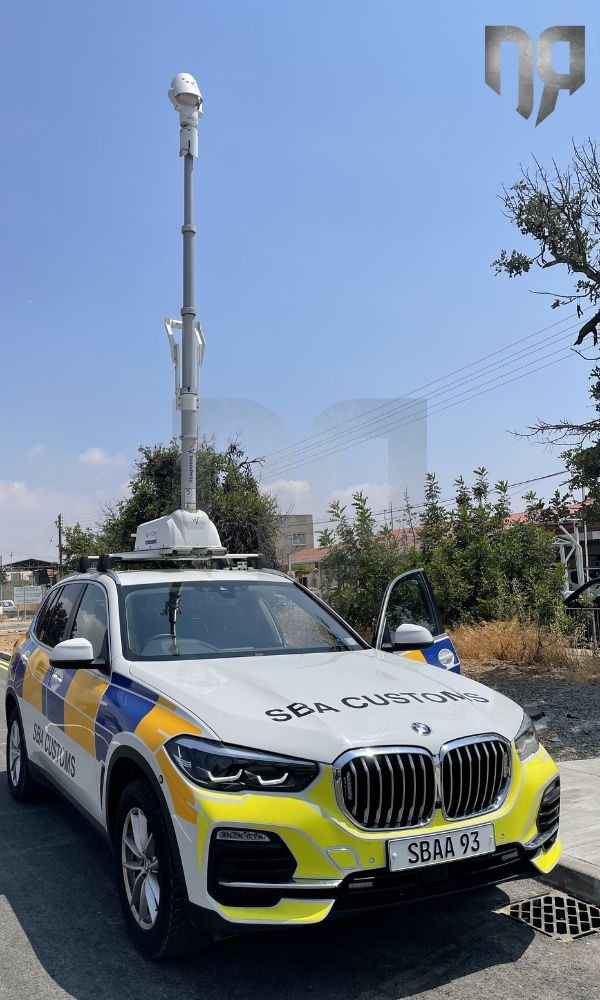
Woodaway’s Night Owl Predator roof mounted mast system in action
Also read: UNFICYP | Αttack on UN patrol vehicle in buffer zone
Now obviously they don’t want to be caught, this is their business, so obviously if we can get early detection, if we use the technological advancements that we have, we can identify these people. And through our relationships with all agencies on the island we can work collaboratively, if somebody is within our jurisdiction, but we believe that they are involved, through our lines of communication, we can alert other agencies to intercept that person as well. So we work jointly to try and identify, for instance, a peoples smuggler. And another example of that is that there have been a number of traffickers that have been arrested and prosecuted in the RoC and in the north of Cyprus.”
LK: From your experience here, is this a problem with the regime in the north? Do they consider smuggling a problem for them as well?
MH: “Massively, yes. If you look at the north as an area, it has a relatively small government, probably a relatively small sort of financial package to support what it does, they, in the north, are also seeing mass migration as we are on the island of Cyprus. So if we split whether we are in the north, the RoC or the SBAs, the island of Cyprus is seeing mass migration. There are a number of teams and agencies in the north that are set up to counteract and stop that and work closely with other agencies, coastal agencies beyond the north and coastline to try and intercept migrants that may be coming for example in boats from Turkey, or Lebanon or Syria or other areas that we see. So, yes, collectively across the island there is significant interception. I think you have to overlay that with reports of 4 to 6 million displaced Syrians in Turkey.
Also read: Cyprus | EU request to suspend asylum to illegal immigrants
There is almost an endless supply of economic migrants that are wanting to get into Europe. Now with Greece increasing its border security in the open press Greece announced that they believe they’ve reduced their migration by 80%. Those people are still looking to try to get into Europe so we are seeing, I believe, more migration to Cyprus and Malta as an effect of that. But collectively, on the island of Cyprus we are all wanting to stop that. But when you have an endless supply of people wanting to get there and victims at the end of the day willing to pay substantial amounts of money. Where there is a financial incentive to somebody there will always be that desire and attempt to circumnavigate, you know, the law really.”
LK: I would add to that “endless supply” Africa as well. The numbers from various African countries coming to Cyprus have skyrocketed. Nigeria, Congo, Cameroon a few years ago, now increasingly Sierra Leone, Somalia, and to add to that, besides war, an increasing problem is the issue of food security and water and drought will only increase. So talking about trafficking, what’s the modus operandi? How do they come here? What are the “mechanics” of this taking place?
MH: “I mean quite uniquely and probably quite an exclusive for you, the SBAs don’t see migration of West African nationals like the RoC do. So its a very interesting point in the fact that, as you say, I was reading in the press something along the lines of 13,000 Western African asylum claims in the Republic, its a significant amount compared to last year. However, none of those nationals were intercepted in the SBAs. So, you just don’t see that migration through the SBAs. Now, the understanding behind that, and I think we are all aware that the West African nationals are using the student visa system so that they’re legally arriving in the north of Cyprus to study in institutes in the north. However, the facilitators are actually just seeing that as a mode of getting set person onto the island and then that trafficking group, that organised group, they are obviously favouring access to the Republic through the buffer zone.
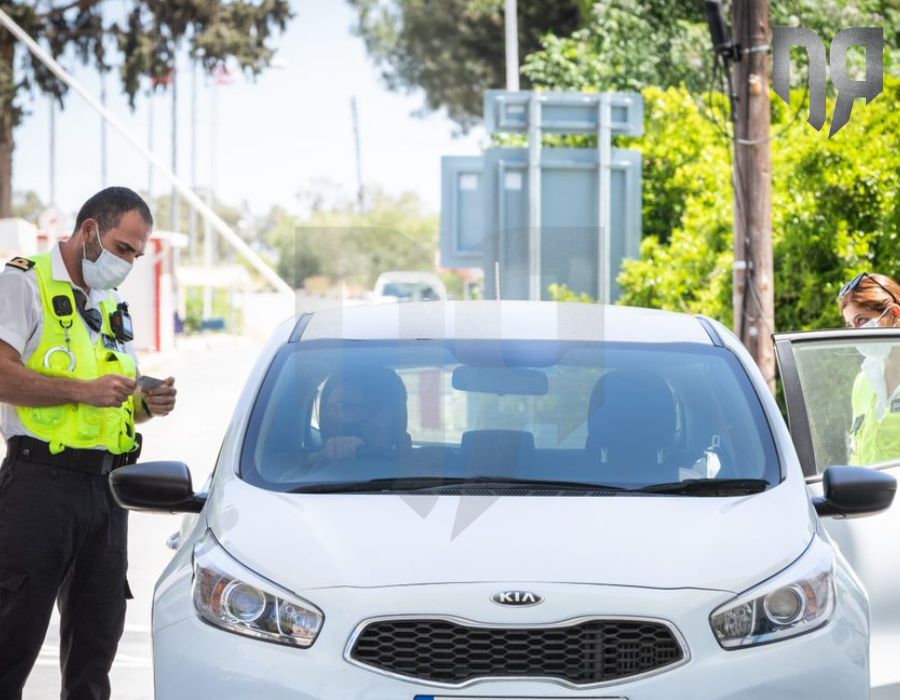
Also read: Repatriation of 2469 immigrants residing illegally in Cyprus for the first half of 2022
So the organised crime groups are offering what they call a ‘service’ to the migrants or the asylum claimants and whether the service they offer is ‘we would get you directly into the Republic to make your claim’. Because we don’t see them in the SBAs and it may be that they feel that they don’t want to be in the SBAs, they don’t want to make claims in the SBAs and maybe understand that we are a sovereign territory within the island of Cyprus. We don’t give access to the EU, their access to that European system is through the Republic and the belief is that at the moment the traffickers are obviously favouring that route.”
LK: I want to ask something in this regard. Why aren’t there migrants who want to seek asylum, or pretend at least to seek asylum, in the UK, so they can use the British Bases’ territory to do that? Because, the migration issue is still a problem in the UK itself despite Brexit. So what happens in this regard? Wouldn’t it be easier for an immigrant to get straight to the UK without having to go through the whole of the European continent if they can enter the Bases in Cyprus? Why seek asylum in the EU and not in the UK directly through the Bases?
MH: “Ultimately the SBAs are not an extension to the UK. So, an Overseas Territory, has its own legislation, has a number of its own policies, therefore an asylum claim in the SBAs is not an asylum claim in the UK. And it doesn’t attract a right of appeal or a right of transfer to the UK. And I think that is quite clear, the SBA is not a back door into the UK and never will be. Otherwise, I’m sure you can appreciate if that was a route it would be opened quite quickly and be flooded. So it’s quite clear under the sovereignty, under the Treaty and under the agreements that we have that that will not, and is not, a right within that. However, there are agreements with the RoC on asylum claims within the SBA. So, in general terms, if somebody has arrived on the island of Cyprus, however their first detection is inland, within the SBA, the Memorandum of Understanding (MoU) could be acted. And the reason behind that is the SBA cannot be responsible for somebody who’s already illegally entered the island of Cyprus. So, say for example somebody arrived by a boat to Paralimni area and then were not detected and they travelled in the country and then put their hand up within the SBA saying ‘I want asylum’ we can’t obviously can’t protect that external border of the island.
Also read: Illegal immigrants | 14 men and a woman arrested in Strovilia, a boat off Cavo Greco
Therefore, the MoU can be enacted where the RoC will hear that person’s asylum claim. Now, obviously, there are still some regulations to that and if that asylum claim was not granted we would still hold some responsibility for that person and the removal of that person. Just to take that and a next step further, the SBA do have their own coastline. So in Dhekelia, for example, and Akrotiri in the Western SBA, the SBA directly have a coastline. We are directly responsible for that coastline and that part of territorial waters. We have a police marine unit, so we have a capability at sea to enforce legislation, enforce the law, and also deter and detect. If somebody does arrive via a boat, for example, directly onto our coastline their asylum claim is with the SBA, however there’s still an agreement and a MoU with the RoC that they will provide assistance in screening that asylum claim and the ultimate decision. However, quite openly and directly, if that asylum claim is not granted, that asylum applicant is the sole responsibility of the SBAs because they directly entered the SBAs. I suggest you look into the Richmond Villagers, there’s Supreme Court hearings and UNHCR involvement, and that’s about a number of Iraqi nationals over 20 years ago that came to Akrotiri.”
LK: What about those who come directly through the occupied area to the Bases and seek asylum? Is it the same procedure as with the coast?
MH: “No, so we revert to the first procedure where we would invoke the MoU through the British High Commission into the Ministry of Foreign Affairs in the MoU to seek their assistance in those circumstances. And we don’t see the Congolese nationals incur the Green Line within the SBAs, we do see numbers of Syrian migrants, and almost exclusively that they do cross. We do have some limited numbers of Pakistani nationals who will be registered in the north and some potential Egyptian nationals. There are smaller sectors of other cohorts, however, over 90% are Syrian nationals who arrive into the SBAs, illegally entering over the Green Line.”
Also read: The British bases in Cyprus included in new London defence strategy
The second part of our interview will be published next Sunday.
The DEFENCE ReDEFiNED team would like to thank the Media and Communication Team of the British Bases for their assistance in conducting the interview.
* Police Studies, Open University Cyprus
READ MORE
BATTLEFIELD ReDEFiNED 2024 | The Major Defence and Security Conference has Started in Cyprus – Photos
The defence and security conference, BATTLEFIELD ReDEFINED 2024, started today and is taking place in Nicosia…
Excalibur Army | Debut in BATTLEFIELD ReDEFiNED 2024
Excalibur Army, a CSG group company based in Prague, is participating for the first time in BATTLEFIELD ReDEFiNED 2024, the leading…
Greece | PDPA’s “yes” to Placing Police Cameras on the Streets
The Personal Data Protection Authority gave the green light to the Hellenic Police’s placement of cameras on the streets to prevent and…
MBDA | Modernising TAURUS Missiles for the Bundeswehr
The Bundeswehr and TAURUS Systems GmbH (a joint venture between MBDA and SAAB) have signed a contract for the maintenance and…
Syria | New Minister of Defence Murhaf Abu Kasra
Syria’s new leaders have appointed Murhaf Abu Kasra, a prominent figure among rebels who ousted Bashar al-Assad, as…
Turkey – Spain | Memorandum of Cooperation for the Development of Turkish Hurjet Training Aircraft
Turkey and Spain have signed a Memorandum of Understanding (MoU) to develop Turkish-made Hurjet trainer-light fighter aircraft.
Red Sea | A US Fighter Jet was Shot Down by Friendly Fire
A US fighter jet was shot down by friendly fire over the Red Sea on Sunday, as announced by the headquarters of the US armed…
Northrop Grumman | Winner of the US Navy’s Next E-130J Aircraft Development Program
Northrop Grumman won the $3.5 billion contract for the US Navy’s E-130J nuclear command, control, and communications (NC3)…








